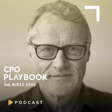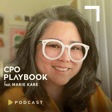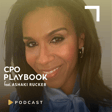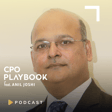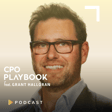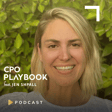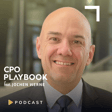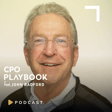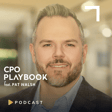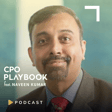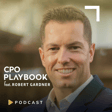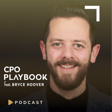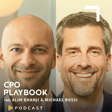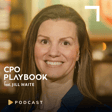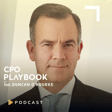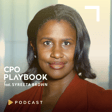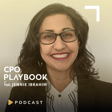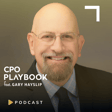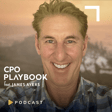Introduction to the CPO Playbook Podcast
00:00:05
Speaker
Hello, everyone. I'm Felicia Shakiba, and you're listening to the CPO Playbook Podcast. Join me and my guests as we feature insightful conversations with HR leaders, people scientists, and executives from diverse industries and functions, offering valuable perspectives on the future of work.
00:00:23
Speaker
Discover a unique outlook on navigating the complexities of the modern-day working world. Exploring innovative strategies in talent management and corporate culture from the Chief People Officer's perspective. Tune in to stay ahead of the game when it comes to all things people related.
Importance of Employee Experience
00:00:44
Speaker
According to a study conducted by Deloitte, a significant number of executives, 80%, recognize the importance of employee experience, yet only 22%, believe their companies excel in building a differentiated employee experience.
00:01:00
Speaker
Surprisingly, research by Alex Edmonds reveals that companies listed among the 100 best companies to work for in America generate 2.3 to 3.8% higher stock returns compared to their peers. This indicates that investing in employee experience can yield tangible benefits.
Discussion with Chandler Bonden from Buzzfeed
00:01:22
Speaker
Today we have a special guest.
00:01:24
Speaker
who will shed light on a company that has successfully integrated and sustained an exceptional employee experience. Join us in this illuminating interview with Chandler Bonden, the Chief People Officer at Buzzfeed. Chandler, thank you for being here today.
00:01:43
Speaker
Thank you for having me. I'm really excited. There are myriad definitions of employee experience. How do you define it at Buzzfeed? So employee experience in general, from my perspective, is an overall journey, satisfaction, and well-being of employees throughout their tenure within the organization. So it encompasses really every interaction and touchpoint an employee has within the company. So that could be from like initial work
00:02:10
Speaker
recruitment process to their day-to-day work, but also when we think about professional development and even exits from the organization. So it's really a whole employee life cycle. Got it. And what's the headcount at Buzzfeed? We're currently full-time. We are around a thousand, give or take.
Buzzfeed's Career Development and Inclusion Programs
00:02:28
Speaker
And what strategies or initiatives are in place to propel employee career development and growth opportunities?
00:02:36
Speaker
within the organization, knowing that professional growth and career development is really a source of engagement. So employee career development and growth opportunities are definitely essential, attracting, retaining talent at BuzzFeed in itself. So we do that in a myriad of different ways. We do that through monthly offering.
00:02:56
Speaker
So we have a newsletter that goes out and there's a topic to either what's going on in the current time. So that could be performance review season, that could be goal planning, kickoffs, things like that. So we try to offer opportunities for people to have training around what
00:03:12
Speaker
we're asking them to do. Sometimes it'll be something fun. So you might have like a personal sign-in month and we might bring in some professionals to talk about those things. We try to do fun offerings in addition to personal growth and career growth. In addition, we have more formal trainings that are available through programming that's normally facilitated by a leadership team member and partnership with our people experience team.
00:03:38
Speaker
Or we could bring in a facilitator to help with a certain topic or a portion of the training. In addition to that programming, we also offer different sort of what we call manager masterclass, where we have topics of, hey, you're leading a team, a function, a project. Here's a topic that we can discuss as a group so people can learn from one another. And that's been really, really fun. And then we also have programming that's geared toward
00:04:04
Speaker
diversity, inclusion, and belonging. So when we think about what would you do in this given situation and we might bring a topic up that has happened in the organization or externally that we know is very meaningful to employees and allows them the opportunity to again learn from one another, but also be able to keep up with what's going on in the industry and what's going on in the world, which right now is so important to employees because they want to feel that connection and that purpose. So we see that definitely add to the experience, to the culture, and to what the company
00:04:34
Speaker
stands for. I love that you shared, that you look at basically the whole person. It's not just about professional growth, but personal growth too, and learning from each other, allowing people to take bite size, learning opportunities.
00:04:50
Speaker
is incredible. I mean, I can just see very clearly how this permeates to every function and have this ongoing effect. Is that what happens at BuzzFeed? Yes. And I think people want to feel valued and want to feel heard and want to know that the organization cares and that the leadership team cares and the easiest way, not easiest, the most important way to do that.
Aligning Programs with Company Vision
00:05:15
Speaker
is by making sure that the content that we bring to employees and the programming aligns to not just the company vision, but what our employees want to continue to grow as individuals. That's an incredible perspective. I wish every leader understood. It fuels someone's
00:05:35
Speaker
values and their own morals of things that they think about. And then they deliver it in a professional way through their world at Buzzfeed. And there's like cyclical cycle that happens and it makes a lot of sense. Let's talk about managers and leadership. So given the emphasis on empowering managers to positively impact
00:05:55
Speaker
the employee experience. Could you elaborate on the specific methodologies or frameworks that are employed at BuzzFeed to enable managers in their pivotal role?
00:06:06
Speaker
Sure. I think we have done a lot of work here by empowering managers that are leading teams, but also project teams because you have cross-functional leaders that might not manage someone's day-to-day, but might manage the growth and trajectory of different projects and go-to-market strategies and business growth.
00:06:27
Speaker
So we've really tried to empower those managers to positively impact the employee experience because it's so crucial to a healthy and productive work environment. And we've done that through leadership development programming. So we have specific programs that are for people managers around how to provide effective feedback, how to lead teams, how to motivate teams, how to recognize talent, conflict resolution, coaching, things like that. So we have that kind of more formalized programming.
00:06:55
Speaker
We also offer different sort of feedback tools. So whether that be 360 models, some engagement surveys, ways for leaders to get feedback from their teams to be able to, again, know what the expectation of leadership is, their peers.
00:07:11
Speaker
see from them and also direct report. So I think that that's a wonderful way to get feedback. But the most important part of getting feedback in a survey form is someone being able to talk through that and be able to action plan for changes that they may need to make in the future. And we also offer a lot of coaching and mentorship opportunities with senior level leaders and also external coaches.
00:07:33
Speaker
where needed and we see a lot of that with people that are taking on maybe larger roles that might be a stretch or I'm leading a sales function and I have really specific targets and goals I need to hit. So you might need someone to come in to help with salesmanship or leading large sales teams and things like that. We obviously have a really big performance management process that happens multiple times throughout the years with check-in and goal settings and
00:07:57
Speaker
checking in on objectives and those key results that we're really looking for. And then obviously building out some of the, I mentioned earlier, but we also are doing a lot of manager dens and conversation amongst groups of people and making sure that people not only can hear from the leadership team, from the employee experience team, but also hear from one another and learn about
00:08:19
Speaker
what matters most to different teams throughout the organization. It sounds like you have a very layered approach. It's not just here are learning and development programs, there's structure, there's mentorship, there's learning from each other. I think it's interesting and I think it's a dream to have something like that at your organization.
00:08:39
Speaker
I'm curious to learn with your executive team, how did you convince them or get buy-in to invest in all of these tools? Or was it difficult or were they supportive? Like, I'm just curious how that communication happens. I think about it.
00:08:54
Speaker
I came into Buzzfeed at the time when I was hired over five and a half years ago to really come in and look at and assess talent and help up skill where needed and help to add these opportunities for employees to learn and grow and to really focus on engagement in a different way. And I really believe that it all starts at the top, obviously, with a leader who can lead a company like Jelena.
00:09:20
Speaker
who really values employees and wants to foster a culture of continuous learning, growth, career development, which ultimately benefits both the employee and the organization as a whole. So we've been very lucky to kind of have a leader that leads by example.
00:09:36
Speaker
Now, when you look at the world and you look at what employees are looking for, they're hungry to know, what's my next move? And not just up a ladder or whatever the terminology was, but also, oh, I'm doing this on this team and it's working well. Can I move to another team or to another function to eventually move up, but be able to have another opportunity to spread
00:09:57
Speaker
best practices to be able to engage others and train others in that kind of mentorship.
Flexible Work and Employee Feedback
00:10:04
Speaker
We have a lot of residence programs and fellowship programs and internship programs to bring in talent that also has new perspectives that people that have been here for a long time can learn from those kind of fresh ideas and it gives you an opportunity to collaborate in different ways.
00:10:19
Speaker
So that's been really impactful as well, but it's a very, very fun place to work. We're very busy and we're having to be really agile as trends with the business change. You have to be able to flip on the dime to be able to do that. And it all starts with the employees and making sure that they feel heard, that they feel seen, and that they have opportunities at the organization.
00:10:39
Speaker
Are there any notable instances that you could share that exemplify the benefits employees derived from the organization's dedication to fostering an exceptional work environment? So the notable instances that we've
00:10:55
Speaker
started to think about employees wanting and needing from a benefits perspective or just creating that exceptional work environment is looking at what matters most to people. And I think we've learned a lot during the pandemic. We've learned a lot from just, again, what's going on in the world today with technology, with AI, all the things. And so for us, with our workforce, we've really had to think about flexible work arrangements. So we obviously have some functions that need to be in person. If we're doing productions, we have
00:11:24
Speaker
office management teams, all those things. There are certain functions that have to be on site, but we have a lot of flexibility around timing of work, around where people can work. And this allows employees to better manage their work and their personal commitments to know that they have that work-life balance.
00:11:43
Speaker
And they also have that support. We do have a very nice PTO plan for employees as well that allows them more time to be able to take offs, to be able to get that recharge. And we really reinforce that like when people are getting towards their cap or
00:12:01
Speaker
If people need some sort of time off, we really, really value that for people to recharge, reset, and be able to encourage employees to take those breaks when necessary for their wellbeing. And then we think about mental health and counseling services and wellness programs and things like that. We have a newsroom that reports on what's going on in the world, and that really does impact
00:12:22
Speaker
sometimes people's mental health. We have writers and content creators that really become a part of the brand. So we want to make sure that we have programs in place to be able to support physical health, mental health, and those kind of things. So we want to make sure that people know that they should get out
00:12:37
Speaker
into the world and move their bodies and we offer health screenings and different sort of stress management programs and things like that to make sure that again we're thinking about the well-being of employees in a different way. We do that also through parental leave and caregiving support.
00:12:53
Speaker
and health insurance and things like that that we're able to provide. So I think we've done a pretty good job of making sure that we hear what employees want and we're able to support them through those services and resources that we can provide. And when you say that you hear what employees want,
00:13:09
Speaker
Is that simply through surveys? Are you doing any focus groups? Is there a cadence? How are you gathering, collecting that data? So we solicit and leverage employee feedback in a multitude of ways. We do that through an engagement survey. We also do pulse checks with different groups and each group has a designated HR business partner who partners with their leadership team of that group and also does risk assessments.
00:13:36
Speaker
We do check-ins on culture of teams. We also do different sort of development programming for teams when they're having team meetings or team events to make sure that the HR team is really ingrained with the senior level leaders of each group.
00:13:53
Speaker
So we get that in a multitude of ways. We also have some feedback tools that are anonymous because we know that sometimes people don't feel comfortable speaking up in the room or answering a survey question that might be tied to their employee ID number. So we have a multitude of ways for people to provide feedback.
00:14:09
Speaker
And then we also have a wonderful way of getting feedback within Slack, which is really popular at BuzzFeed. So we are able to ask questions and get very real time and very truthful feedback that way, which has been really, really nice for teams to be able to just in time give feedback and not feel like they have to sit down and take a 30 minute survey. So again, lots of different ways to get feedback. I think that we've done a pretty good job of making sure that our HR business partner team is really ingrained
00:14:38
Speaker
That's so interesting because I feel like when tools or engagement tools have come out, at least in my experience, I've seen, oh, anonymous is better or not anonymous is better. There's this argument between which one is the right choice, but it doesn't seem like you made that choice. You made actually the choice to have both of those and you're making it
00:14:59
Speaker
more comfortable for people to want to get feedback. And I'm sure that there is this loop of coming back to people and making sure that the organization follows through. Yes.
00:15:10
Speaker
I really appreciate that because we really had to think about how can people supply feedback? How can we support and hold ourselves accountable as an organization and really integrating employee feedback into the company's decision-making processes? How the organization defines itself? How can we enhance that employee experience to ensure that it remains aligned?
00:15:34
Speaker
to the evolving needs and expectation. I think that that definitely leads to higher levels of employee satisfaction, engagement, retention, which again directly impacts the bottom line and making sure that we are productive and that we do care and that we lead with transparency in a lot of ways to make sure that employees feel heard. So I definitely think that having a multitude of ways
00:15:57
Speaker
to get feedback and to actually have a person and not just email address that you can hide behind or virtual way that you're getting feedback. We like to do discussion groups. And again, it's all about not just learning from HR or from the leadership team, learning from one another.
00:16:13
Speaker
Manager that manages a team of 10 people is going to learn so much from another manager that might be in a similar situation and they're just on a different team, but they wouldn't have connected unless we had these discussion groups or feedback sessions or ways for people to connect. So it's really about communication, about getting feedback, but also action planning and make sure that you're communicating how you're making changes and why you're making changes.
00:16:37
Speaker
I love the idea of having these feedback groups together where managers from different functions come together and talk about these things because we're all managing people. I mean, yes, people are engineers and they're in marketing and so forth, but they're people. And I think that also creates more of a bond around leadership. It sounds like it would.
00:16:58
Speaker
Yes, I definitely think so. A lot of leaders appreciate time to take a step back from the day to day and think about things that they may not have the opportunity to when you're heads down working on a project or you have a deadline and all those things.
00:17:14
Speaker
And one of the sessions that I love most that we offer to leaders across the organization and individual contributors, we just kind of break them up separately because the conversation is different, is it's called what would you do? And it's a situation that maybe has come up in the organization or is going on in the world. And you talk through, hey, you know, this is what happened. How would you solve this as a leader? And someone on the tech team might think of it differently than someone on a content team or on a branded team.
00:17:44
Speaker
And so it brings people together to say, hey, this is how I would go about having this conversation or providing feedback or finding a solution. And someone else might say, well, that's a good idea, but have you ever thought about this tool that we have available to us on the company intranet or did you reach out to your HR business partner? So it's kind of a fun way for people to learn, for us to learn from mistakes or areas of opportunity.
Fostering Creativity and Problem-Solving
00:18:09
Speaker
And then it also allows us to bring in real life examples or real world examples to make sure that people know that we're constantly evolving with, again, what's going on out in the world today with technology changing, with the election coming up and things that really have an impact on the content that we create and the services that we provide. I love this example because you're solving so many problems.
00:18:31
Speaker
that companies have just with this one program because it's also diversity of thought and perspective. And so you're bringing in these ideas from all these different angles and people are collaborating and they're learning and they're probably doing it on a regular cadence of some sort. They're building trust in relationships. Psychological safety must be through the roof. I'm obsessed with what you've done.
00:18:55
Speaker
I truly love this program. So yeah, I mean, I would definitely participate. Right. Something that you don't want to offer too much of and you don't want to over program. So I think that the team has done a wonderful job of looking at our HR calendar and knowing what do we want to schedule? When do we want to schedule it? What makes the most sense for
00:19:14
Speaker
managers for individual contributors and then for maybe senior level executive leadership. So I think that it's all about what level people are at. How can we get people to connect more? And that helps build on the culture and also build on learning from one another, collaborating, and again, kind of pushing the envelope in regards to people not just learning from the powers that be, but getting to learn from one another.
00:19:40
Speaker
do leaders at their own level meet with other leaders at their level? Or are they mixed? Or how do they usually come together? So we have like foundational leadership program that's normally for a certain level leader. Our executive leaders wouldn't necessarily be in those sessions. But when you think about discussion groups, we call them manager dens just to make it sound a little fun. Our manager dens or what would you do type sessions, those could be a mix of senior level leaders and mid-level managers.
00:20:09
Speaker
We also have individual contributor programmings. We have another program that's called the Emerging Leader Program, and that's geared towards people that want to eventually move into a leadership role, and they've been identified as a high potential in the organization. And people can get nominated to be in that program, or they can self-nominate, which allows, again, people to feel like they're a part of who's being selected into the program. And because it requires time outside of your day-to-day work to be able to go to these
00:20:38
Speaker
facilitated sessions to workshops, to dens, to some outside of your day-to-day work. We wanted to make sure that there was ownership from the leaders across the team and to make sure that we had representation across the organization as well. So that's been something that I think has been wonderful for people to be able to feel like they're ready for that next level. And then when there is opportunities, they can then move into the next program, which will be the foundational leadership.
00:21:04
Speaker
Yeah, that makes sense. I love that you guys implemented emerging leaders. You guys went outside the box. It's not about the current leaders. It's also about supporting the future leaders. I think you just like take it full circle. So how do you measure the progress of a successful employee experience?
Measuring Employee Experience Success
00:21:22
Speaker
We do that in a multitude of ways. So this year we're very excited. We're launching a new performance review process along with the actual performance review itself. So we're focusing on three key areas. That would be goals that the team has set and making sure that everybody has played a role for those goals. And it gives people an opportunity to give feedback on here's what I did in my day-to-day work. Here are the projects that I completed to get to this team goal.
00:21:50
Speaker
The next one is around performance dimensions or qualities that the entire organization has agreed upon of how we want to measure talent. So we're all using the same language, we're able to measure it in the same way, ratings. And then the last piece is kind of an open-ended approach that we've used previously that we still wanted to include around what are your strengths? How did you go above and beyond?
00:22:14
Speaker
What areas of opportunity do you see and where do you want to go from here? So it allows us kind of a stamp of time. So that's what we're looking at in regards to a formal performance piece. As we think about employee experience as a whole and culture challenges and
00:22:31
Speaker
how we want to continue to enhance work dynamics and things like that. We definitely focus on the polls checks that we do, the engagement survey that we do. We also look at talent and we have quarterly benchmarking that we do. So we do risk assessments as part of the year to get information on who are hypos, who are people that they left tomorrow. It would be detriment to the organization and how can we make sure that we're providing the right career development opportunities
00:22:59
Speaker
and programming to those individuals and how can we make sure that our leaders of teams know how to lead talent across their team. So I think that there's like a multitude of ways that we looked at measuring that. We do a lot of dashboarding. The team, our people operations team has done a wonderful job of building out dashboards for leaders to use within our HRIS. So they're able to go in and they can see what is my retention for my team.
00:23:25
Speaker
What are the DIMB, the diversity inclusion belonging staff for my team? What headcount am I looking at? Where are people sitting? Are they mostly on the East Coast versus the West Coast? All the basics, but I think it provides leaders a snapshot of their teams to continue to have that information and to be able to utilize that with the feedback that they're given. So that way they have, again, a multitude of ways to look at a feedback.
00:23:49
Speaker
Yeah, the data is incredibly diverse. You're looking at it. It's so many different angles that you have plenty of data to make great decisions, it sounds like. Yeah, and I think it's also looking at strategies that you can use. So like you need to define a clear employee experience vision and make sure that you have that and you have to develop those employee experience standards, implementing company-wide policies and practices that are inclusive.
00:24:17
Speaker
and really owning that code of conduct and making sure that people know. I know that it sounds basic, but it's making sure that people know what the expectation is of being an employee, an organization. Communication training, feedback and continuous improvement, planning and distributing leadership and making sure that we're empowering leaders and managers in different departments and locations to really take ownership of employee experience within their teams.
00:24:42
Speaker
making sure that you have cross-functional teams and committees that can represent various departments and location, looking at tools and technology. I know that that sounds also pretty basic, but it also helps with process improvement and making sure that you're holistically looking at processes, policies, performance management, benefits, administration, and things that are so important from an HR perspective that
00:25:04
Speaker
employees have doing all the fun, regular audits, assessments, things that maybe sound a little not as much fun as recognition and rewards and things, but all of those things matter. And they build strong foundation for employees to really own the culture and build off of. So it's a longer process. It's not something that's going to happen overnight, but with the right people in place and with the right support from the leadership team, you're really creating an inclusive and a very, very driven organization.
Maintaining Employee Well-being and Culture
00:25:34
Speaker
Candler, is there anything that we haven't talked about that you want to share? No, I mean, I think I've hit on a lot of it. I just think that stay in age with how the world work and how we want to continue to make sure that employees well-being are being thought of. We really have to be proactive and comprehensive on that approach by combining standardization, communication, training, feedback, and leadership engagement to make sure that companies can ensure that
00:26:01
Speaker
they commit to that exceptional employee experience that really permeates throughout different departments and locations and even face the challenges or variations in work dynamics. So I just think that with consistency, we can continue to build strong company culture and help attract and retain that talent that organizations need to be successful.
00:26:21
Speaker
And that leadership support is so critical. Chandler, thank you so much for being here. I am so thrilled you're on the show. This has been amazing. Thank you. Thank you. That's Chandler Bonden, Chief People Officer at BuzzFeed.
Podcast Conclusion and Further Resources
00:26:43
Speaker
If you like today's podcast, we have more podcasts on innovative HR strategies, talent management, organizational culture, and more, and how to navigate the complexities of modern day HR. Find them at cpoplaybook.com slash podcasts, or search CPO playbook on Apple podcasts, Spotify, or wherever you listen. Thanks for listening to the CPO playbook podcast. We'll be back with a new episode next time.
00:27:14
Speaker
I'm Felicia Shakiba.
00:27:35
Speaker
And if you have an idea you would like us to talk about or a guest you'd like to nominate, visit cpoplaybook.com slash contact us to suggest an idea.

